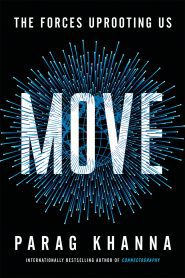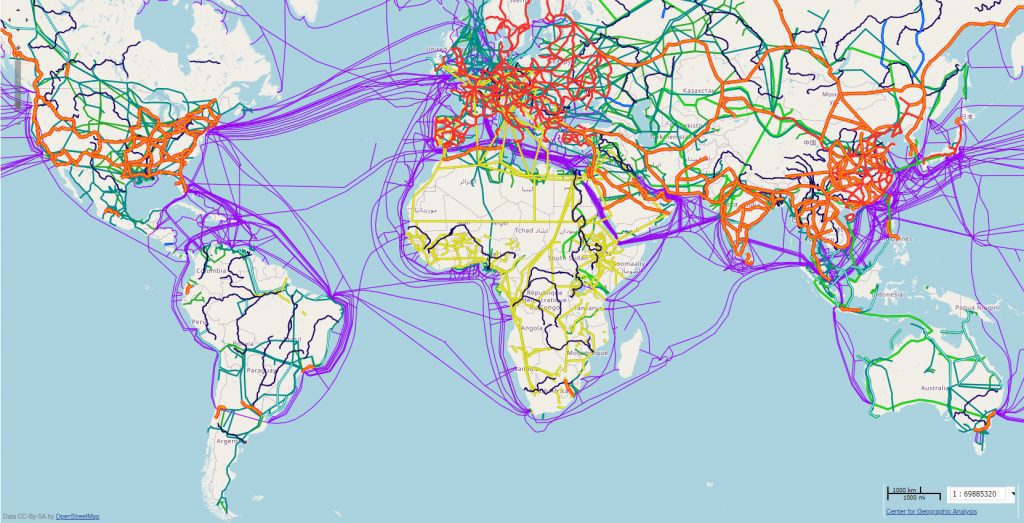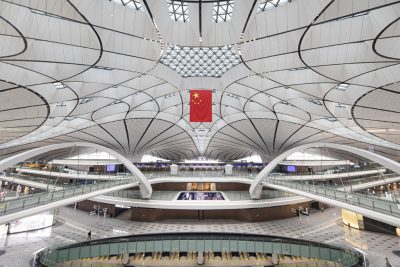
Be a part of Skift editors and study analysts as we take a look at our 2021 topic: Reigniting Travel’s New Economic system. Now in its eighth 12 months, Skift World wide Forum 2021 is wherever international market leaders will occur jointly to discuss travel’s fantastic comeback, creating this Discussion board the most consequential in its background.
How we live and work morphed in the pandemic. In the long term, migrations will scatter equally the dispossessed and the very well-off. How can travel develop into a geopolitical drive for very good in our entire world increasingly on the move?
Parag Khanna, an creator and a geopolitical scientist, gave a lot of believed to this matter when crafting his most recent reserve, Shift — which examines the forces uprooting the globe.
We spoke with Khanna about what the travel sector requirements to know about the coming upheaval in mobility. The chat was prelude to his job interview with Skift CEO Rafat Ali at Skift Worldwide Forum on September 21 at the TWA Lodge in New York City.
We have lightly edited the discussion for clarity.
Skift: Your upcoming book Transfer (on sale October 5th in the U.S.) gives an illuminating and authoritative eyesight of the potential. What do final decision-makers in the journey industry need to know?

Parag Khanna Creator
Parag Khanna: We’ve absent from the Excellent Lockdown to the Good Reset, and quickly we’ll have the Excellent Migration.
The vacation business is central to this up coming phase of heritage. You should really believe of yourselves billed with organizing human mobility past anyone’s hometown. This is an very potent function and obligation. You can condition what we build and wherever we make, exactly where persons go and how they get there, and even what people today do and how they do it.
But allow me again up: It is ironic that, in January 2020, we realized that 2019 experienced witnessed the maximum number of international travelers in history [1.5 billion], and the amount of migrants also stood at practically 300 million.
Because then, we’ve experienced the Wonderful Reset, with a lot of men and women returning “home” — wherever that is — not understanding if it’s non permanent or permanent.
Next we will enter an period of great migrations, unlocking worldwide mobility.
All the forces that drive persons to uproot on their own are accelerating concurrently: the demographic imbalances amongst old and young, political instability, economic crises, technological disruptions, and local weather change. Taken alongside one another, I imagine we will go from virtually zero migration in 2020 to a resorting of billions of persons in the unfolding article-pandemic period.
It is imperative that we take care of this subsequent phase of migrations superior than in advance of for the reason that the stakes are a lot greater. The world populace is achieving a plateau. If we want to preserve economic momentum, it will have to be inclusive and centered on the world’s four billion younger persons, assisting them get to the place they will need to be to direct much more productive life.
We also require to adapt to weather alter. There are locations in the globe that have grow to be successfully unlivable, and persons ought to be relocated away from them.
There’s literally almost nothing more significant than relocating folks and connecting them, interval. The journey sector has a historic purpose.
Sign up for Us at Skift Worldwide Discussion board in NYC September 21-23

Shift, the newest e book by Parag Khanna.
Skift: Presented the coming shifts in mobility, how can executives make certain the travel business functions as a pressure for very good?
Khanna: Access is the vital word.
We’re not seeing government leadership transcending today’s hyper-bureaucratized vacation and migration technique. That initiative is going to have to come from the journey marketplace.
Immunity passports, journey record, prison documents, money statements — we need to be digitizing these certifications and build secure blockchain platforms that relieve the exchange of facts throughout responsible companies. We have to have passports on apps.
Of study course, we anticipate neutral international bodies to administer these units, but the vacation sector is much more tech-savvy than the usual authorities. Also, you have bigger commitment for the reason that you are losing out in the lag time amongst today’s antiquated bureaucracy and tomorrow’s additional economical global mobility.
Basically, the vacation business has to establish the instruments that make it less complicated for governments to say “yes” to bigger mobility when also making the specifications additional palatable to citizens and buyers.
Yet again: what could be much more crucial when we’re talking about the billions of men and women who require to and want to shift?

Harvard Environment Map of Connectography is a collaboration with Jeff Blossom of the Harvard Heart for Geographical Assessment.
Skift: How do travel executives need to have to rethink their implicit assumptions about “the “Asian market” option, “Northism,” or other wide-brush generalizations?
Khanna: I have put in a large amount of time with governments and organizations tinkering with maps and org charts. Does “EMEA” make perception? Does India belong in “APAC” divisions, or ought to it be a sector unto by itself? And so forth.
Asia is the the vast majority of the human populace and often will be — and it is the speediest-rising area economically as properly. Travel within Asia is escalating multiples more rapidly than journey outside it. But Asia is also the most significant new vector of global migrant flows: concerning Asia and Europe.
In the reserve, I describe how a new class of “Asian-Europeans” is rising as Asian businesspeople, travelers, and learners increase their numbers in Europe. Asians will play a huge purpose in serving to Europe get over its acute labor shortages in health care, know-how, and other sectors. Furthermore, Europe is a considerably more local climate-resilient region.
In conditions of professional mobility, we unquestionably see much more “Northism” in that Canada and northern European international locations have risen to the top rated of indices of ex-pat desirability. I also forecast a significant increase in summer time (and winter) tourism in northern international locations, including Russia.

James Jianzhang Liang, chairman of Trip.com Group and cofounder of Ctrip.com, has finished a pair of dozen “Boss Reside Stream” webcasts in 2020. Resource: Trip.com Team.
Skift: In on the net vacation, there is been a variety of “travel giant triumphalism.” Some people have thought e-commerce multinationals will dominate commercially in all marketplaces. Will Major Tech inherit the Earth?
Khanna: Given the dimensions of the North American, European, and Chinese vacation marketplaces, it is no shock that they and their e-commerce and travel giants dominate and have the foundations to scale globally.
They are also getting to be more interoperable, as we see through the attempts of Ctrip with Tripadvisor.
I see this phenomenon significantly less from the perspective of which countries’ organizations have a world-wide market place share and irrespective of whether popular specifications are emerging. Adopting this standpoint concentrations the playing discipline and will help get us nearer to the seamless and inclusive mobility that really should be the industry’s prevalent agenda.
Skift: But Parag, are there dynamics in participate in that could permit new vacation giants to emerge and prosper in markets like South Korea, Indonesia, Singapore, India, Japan, Mexico, Dubai, Brazil, and Argentina? Can these upstart corporations maintain their individual against the tech giants from the U.S., China, and Europe?
Khanna: We have to believe of this in terms of cross-border partnerships and considerably less as a massive-as opposed to-smaller, West-versus-rest form of scenario.
The world wide players need neighborhood partnerships and expense in setting up up nearby offer chains and industries. It’s symbiotic, the way foreign expense nearly often is.

An atrium in Beijing Daxing International Airport. Source: Arne Müseler / Artistic Commons
Skift: You are at the moment investigating artificial intelligence’s (AI’s) broader effect. Could you share insight into AI’s likely effects that may possibly shock people who have not adopted AI intently?
Khanna: What we have found so far in AI applied to journey is promising and surely adds to our comfort, from chatbots to written content generation to personalization of consumer knowledge. GPT-3 could be incredibly helpful in this article as effectively for interactivity.
No doubt, we’ll also see more augmented reality together the continuum from travel planning to navigating matters to do in dense towns.
All of this contributes to a little something higher that has been accelerating because the pandemic: the mixing of perform and way of life. Vacation and migration are also fusing as people select to work remotely from disparate destinations more than a 12 months or consistently. As relatives measurements shrink, but connectivity expands, it’s less very likely that people will sense the need to “settle down.”
In Transfer, I also have a segment on the expanding ranks of mobile retirees — precisely the opposite of the sedentary character of retirement as a result significantly.
Remember that the earth is sophisticated. Even if you want to keep place, politics or the surroundings may perhaps force you to transfer. To go is human. We really should get back self-assurance in turning into nomadic all over again and make the practical experience as cozy as possible. Who else to belief with this fantastic duty than the vacation field?
Discover from Parag’s Job interview With Rafat Ali. Sign up Now for Skift Worldwide Forum September 21-23

